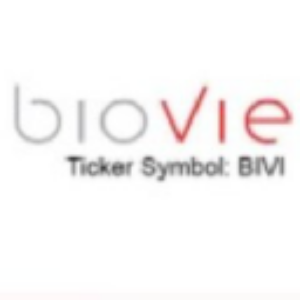BioVie Presented Data Highlighting that Patients Treated with Bezisterim Potentially Experienced an Age Deceleration Advantage Compared to Placebo on 10 Different Biological Clocks at the 2nd World Conference on Aging and Gerontology
Rhea-AI Summary
BioVie (NASDAQ: BIVI) presented promising data from their Phase 3 NM101 study of Bezisterim at the 2nd World Conference on Aging and Gerontology. The study revealed that Alzheimer's Disease patients treated with Bezisterim experienced significant age deceleration compared to placebo across multiple biological clocks.
Key findings showed age deceleration advantages including -3.16 years for SkinBloodClockAge (p=0.036), -4.12 years for PhenoAge (p=0.048), and -3.77 years for InflammAge (p=0.050). The treatment demonstrated improvements in metabolic and inflammatory biomarkers, including reductions of 8.5 mg/dL in fasting glucose and 15 mg/dL in cholesterol.
Bezisterim, a stabilized version of Beta AET, showed potential in modulating gene expression related to inflammation, aging, and Alzheimer's Disease pathophysiology, while maintaining favorable safety profiles.
Positive
- Significant age deceleration demonstrated across multiple biological clocks compared to placebo
- Improvements in key metabolic and inflammatory biomarkers including glucose and cholesterol levels
- Favorable safety and tolerability profiles shown in clinical trials
- Unique ability to cross blood-brain barrier while being orally available
Negative
- Study sample size was relatively small with only 33 blood samples analyzed
- Some results, like GrimAge clock (-1.38 years), showed less statistical significance (p=0.148)
News Market Reaction
On the day this news was published, BIVI declined 8.37%, reflecting a notable negative market reaction. Argus tracked a peak move of +7.0% during that session. Argus tracked a trough of -15.1% from its starting point during tracking. Our momentum scanner triggered 10 alerts that day, indicating notable trading interest and price volatility. This price movement removed approximately $1M from the company's valuation, bringing the market cap to $15M at that time.
Data tracked by StockTitan Argus on the day of publication.
Bezisterim treatment appears to be associated with changes in DNA methylation of over 100 genes related to aging and diseases of aging
CARSON CITY, Nev., July 24, 2025 (GLOBE NEWSWIRE) -- BioVie Inc. (NASDAQ: BIVI) (“BioVie” or the “Company”), a clinical-stage company developing innovative drug therapies for the treatment of neurological and neurodegenerative disorders and advanced liver disease, presented “Bezisterim Decreases Biological Age Acceleration in Alzheimer’s Disease” at the 2nd World Conference on Aging and Gerentology (WCAG-2025) in Rome, Italy July 14-15, 2025.
As the body ages, a natural process called DNA methylation occurs and adds “methyl” groups to the surface of DNA. Accumulated methylation has the impact of interfering with how DNA is decoded and thus has been shown to impact a wide range of diseases, including age-related cognitive impairment and dementia,1 Parkinson’s disease,2 various forms of cancers,3 cardiovascular disease, 4,5 COPD and respiratory disease,6 chronic kidney disease,7 inflammatory bowel disease,8 sepsis,9 and many others.
The extent of DNA methylation can be measured by various “biological clocks” to assess a person’s “biological age,” which may be different from a person’s chronological age (i.e., years since birth). The difference is considered to be age acceleration or deceleration. The enzyme DNA methyltransferase 3A (DNMT3A) plays a key role in driving the methylation of DNA, and TNFα-driven inflammation has been shown to increase DNMT3A’s activity and thus DNA methylation of many different genes.
Bezisterim modulates TNFα-driven inflammation and is believed to help reestablish homeostasis and small changes in many genes at the same time. An analysis of the Company’s Phase 3 NM101 study (NCT04669028) evaluating bezisterim in patients with mild-to-moderate probable Alzheimer’s Disease (AD) assessed 33 blood samples of patients treated with bezisterim (n = 17) and placebo (n = 16) revealed:
- Biological aging. After 30 weeks of treatment, bezisterim-treated patients experienced significant age deceleration compared to placebo-treated patients on all biological clocks assessed, including −3.16 years for SkinBloodClockAge (p = 0.036), −4.12 years for PhenoAge (p = 0.048), −1.38 years for GrimAge (p = 0.148), −4.24 years for Hannum clock (p = 0.015), and −3.77 years for InflammAge (p = 0.050).
- Inflammatory gene expression. Bezisterim appeared to modulate gene expression of dozens of genes in the inflammatory cascade (e.g., NFkB, MAP, JNK), resulting in reduced expression of inflammatory cytokines, including TNFα, IL-6, and IL-17.
- Aging and Alzheimer’s Disease. Bezisterim appeared to have potentially beneficial modulation of many of the genes associated with aging and AD pathophysiology as identified by the National Institute on Aging’s Accelerating Medicines Partnership in Alzheimer’s Disease (AMP-AD) Consortium.
- Metabolic and inflammatory biomarkers. Bezisterim appeared to modulate many genes associated with carbohydrate metabolism, glycolysis, and Type 2 diabetes. Bezisterim-treated patients also experienced significant improvements from baseline on metabolic and inflammatory biomarkers compared to those treated with placebo, including -8.5 mg/dL on fasting glucose (p=0.036), -15 mg/dL in cholesterol (p=0.049), and -90.5 pg/mL in MCP (p=0.007). Bezisterim-treated patients also experienced improvements in methylation of genes associated with carbohydrate metabolism, glycolysis, and Type 2 diabetes pathophysiology.
“The research community has grown accustomed to looking at one or a few genes as the driving factor behind disease,” said Christopher Reading, PhD, Senior Vice President of BioVie’s Alzheimer’s Program. “Our experience with bezisterim suggests that AD may be much more complicated, and that disease physiopathology may involve dozens of genes that work in tandem through biochemical cascades to affect disease. These data suggest the potential to target epigenetic-driven age deceleration as a treatment for AD and other neurodegenerative diseases of aging. We are conducting ongoing studies to further explore these intriguing findings and considering whether bezisterim might help everyone improve healthspan in normal aging.”
Bezisterim is a unique, stabilized version of Beta AET, a naturally occurring brain metabolite of dehydroepiandrosterone (DHEA), which has demonstrated decreased metabolic inflammation activity in humans, but that naturally decreases with age. Beta AET itself cannot be taken in oral form, a major limitation that Bezisterim overcomes. Unlike its naturally occurring counterpart, Bezisterim is metabolically stable, orally available, and able to cross the blood-brain barrier. It has demonstrated anti-inflammatory effects through inhibition of NF-kappa B, a central mediator of inflammation, and has shown insulin-sensitizing properties. Notably, Bezisterim is not immunosuppressive, and has demonstrated favorable safety and tolerability profiles across in-vivo clinical trials in AD and Parkinson’s Disease (PD).
About Bezisterim
Bezisterim (NE3107) is an orally bioavailable, blood-brain barrier (BBB)-permeable modulator of inflammation and insulin-sensitizer. In addition, it is not immunosuppressive and has a low risk of drug-drug interaction. By binding to ERK and selectively modulating NFκB activation and TNF-α production, BioVie believes that bezisterim may offer clinical improvements in several disease indications, including AD, PD and long COVID.
In PD, BioVie is currently enrolling patients in the Phase 2 SUNRISE-PD clinical trial evaluating the safety and efficacy of bezisterim on motor and non-motor symptoms in patients who have not been treated with carbidopa/levodopa, with topline data expected in late 2025 or early 2026. A previous Phase 2 study of bezisterim in PD (NCT05083260) completed in 2022, and data presented at the AD/PD™ 2023 International Conference on Alzheimer’s and Parkinson’s Diseases and related neurological disorders in Gothenburg, Sweden in March 2023, showed significant improvements in “morning on” symptoms and clinically meaningful improvement in motor control in patients treated with a combination of bezisterim and levodopa versus patients treated with levodopa alone, and no drug-related adverse events.
In long COVID, we believe bezisterim has the potential to reduce neurological symptoms, including fatigue and cognitive dysfunction. Persistently circulating viral spike proteins are believed to trigger TLR-4 driven activation of NFκB and the subsequent expression of inflammatory cytokines (IL-6, TNF, IFNg). BioVie’s Phase 2 ADDRESS-LC study, is a randomized (1:1), placebo-controlled, multicenter trial in approximately 200 patients to evaluate the safety, tolerability and potential efficacy of 3 months of treatment with bezisterim to reduce the neurocognitive symptoms associated with long COVID, including difficulty concentrating or remembering things (“brain fog”) and fatigue.
In AD, BioVie conducted and reported efficacy data on its Phase 3 randomized, double-blind, placebo-controlled, parallel-group, multicenter study to evaluate bezisterim in patients who have mild-to-moderate Alzheimer’s disease (NCT04669028) in 2023. Results of a Phase 2 investigator-initiated trial (NCT05227820) showing bezisterim-treated patients experienced improved cognition and biomarker levels were presented at the Clinical Trials on Alzheimer’s Disease (CTAD) annual conference in December 2022. An estimated six million Americans suffer from AD.
About BioVie Inc.
BioVie Inc. (NASDAQ: BIVI) is a clinical-stage company developing innovative drug therapies for the treatment of neurological and neurodegenerative disorders (AD, PD and long COVID) and advanced liver disease. In neurodegenerative disease, the Company’s drug candidate bezisterim inhibits inflammatory activation of extracellular signal-regulated kinase and the transcription factor nuclear factor-κB, and the associated neuroinflammation and insulin resistance but not ERK and NFκB homeostatic functions (e.g., insulin signaling and neuron growth and survival). Both neuroinflammation and insulin resistance are drivers of AD and PD. Persistent systematic inflammation and neuroinflammation are key features in patients with neurological symptoms of long COVID. In liver disease, the Company’s Orphan drug candidate BIV201 (continuous infusion terlipressin), with FDA Fast Track status, is being evaluated and discussed with guidance received from the FDA regarding the design of Phase 3 clinical testing of BIV201 for the reduction of further decompensation in participants with liver cirrhosis and ascites. The active agent is approved in the U.S. and in about 40 countries for related complications of advanced liver cirrhosis. For more information, visit www.bioviepharma.com.
Forward-Looking Statements
This press release contains forward-looking statements, which may be identified by words such as "expect," "look forward to," "anticipate" "intend," "plan," "believe," "seek," "estimate," "will," "project" or words of similar meaning. Although BioVie Inc. believes such forward-looking statements are based on reasonable assumptions, it can give no assurance that its expectations will be attained. Actual results may vary materially from those expressed or implied by the statements herein due to the Company's ability to successfully raise sufficient capital on reasonable terms or at all, available cash on hand and contractual and statutory limitations that could impair our ability to pay future dividends, our ability to complete our pre-clinical or clinical studies and to obtain approval for our product candidates, our ability to successfully defend potential future litigation, changes in local or national economic conditions as well as various additional risks, many of which are now unknown and generally out of the Company's control, and which are detailed from time to time in reports filed by the Company with the SEC, including quarterly reports on Form 10-Q, reports on Form 8-K and annual reports on Form 10-K. BioVie Inc. does not undertake any duty to update any statements contained herein (including any forward-looking statements), except as required by law.
For Investor Relations Inquiries:
Chuck Padala
LifeSci Advisors, LLC
chuck@lifesciadvisors.com
For Media Inquiries:
Melyssa Weible
Elixir Health Public Relations
mweible@elixirhealthpr.com
1 Sugden K Neurology 2022;99:e1402-e1413
2 Tang X DOI: 10.1002/mds.29157
3 Wang Z Nucleic Acids Research, 2020, Vol. 48, No. 5
4 Stenvinkel P doi: 10.1111/j.1365-2796.2007.01777.x
5 Tabaeia S Artificial Cells, Nanomedicine, and Biotechnology, 47:1, 2031-2041
6 Qiu W Am J Respir Crit Care Med Vol 185, Iss. 4, pp 373–381, Feb 15, 2012
7 Rysz C Int. J. Mol. Sci. 2022, 23(13), 7108
8 Kraiczy J Mucosal Immunology volume 9, pages 647–658 (2016)
9 Rump K Sci Rep 9, 18511 (2019)








